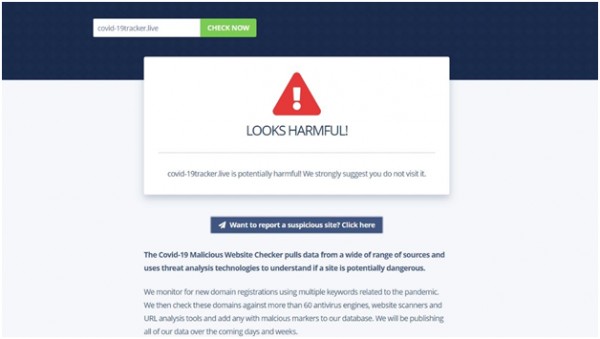With over half a million confirmed Coronavirus cases (and counting), things are pretty scary and uncertain right now. But that doesn’t discourage hackers from taking advantage of unsuspecting victims.
In fact, scammers have now started using different tactics – ones that blend in perfectly with the whole pandemic.
A Hacker’s New Best Friend – Fake COVID-19 Websites
People are paranoid and scared, and they use any website they can find to keep tabs on the COVID-19 crisis – whether it’s to see the latest cases, check a live map of how the virus spreads, or find out what the latest recommendations from organizations like the CDC and WHO are.
Scammers have noticed the latest search trends, and they started setting up fake websites about COVID-19. Basically, the sites look legitimate, but run malicious code and malware in the background. If you use such a website, it’s very likely that your device will be taken over by malware – spyware, ransomware, rootkits, Trojans, you name it.
How bad is the situation?
Well, data shows that, since January, there were over 4,000 domains about COVID-19 registered worldwide. Experts think that around 5% of those domains are malicious, and an extra 5% are suspicious. That means around 400 websites about Coronavirus are a potential threat.
It might not seem like much, but get this – the malicious rate for Coronavirus-related domains is 50% higher than the rate for normal domains that were registered in the same period. So that 400 number can easily go up soon.
Here’s what kinds of “creative” scam websites hackers have been coming up with:
- Fake malicious live maps that use a legit map from John Hopkins University to trick people.
- Scam sites that sell fake Coronavirus cures.
- Fake websites that sell counterfeit masks and fake self-testing kits.
- Phishing sites that promise access to tax refunds, health guides, and cures in exchange for sensitive personal and financial information (like Social Security Numbers and credit card details).
How to Stay Safe
Most online articles say you can spot a fake COVID-19 website by checking if they use HTTP instead of HTTPS, fake logos, and bad grammar.
However, those tips aren’t 100% reliable. Scammers can actually get HTTPS certificates for free in a few minutes, and they can put enough effort into their fake websites to make them look very legit.
It’s much, much easier to use a Coronavirus scam website checker, like the one we just linked. Just copy the URL there, and it’ll tell you instantly if it’s a legit website or a scam.

Besides that, you should also use antivirus software, script blockers, and anti-phishing browser extensions.
Conclusion
As tempting as it might be, don’t click on all the COVID-19 websites you see. Some might actually run malware in the background that will infect your device in seconds.
Before you visit a Coronavirus-related website, use the scam checker we linked above. The tool also has links to official sources you can use to keep yourself up-to-date with what’s going on in the world.
 Gearfuse Technology, Science, Culture & More
Gearfuse Technology, Science, Culture & More


